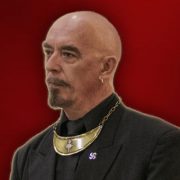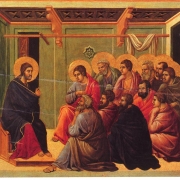An Odinist view of Original Sin
ODINISM is an optimistic and life-asserting religion, which, because it is a natural religion, believes that man, through his own endeavours, can lead a life which is noble, virtuous and good.
Such an eminently reasonable view, a view with which most people would agree, is in sharp contrast to the morose Christian doctrine of original sin, which teaches that man is born in sin, essentially depraved and inevitably prone to evil.
Masochists may derive some pleasure from convincing themselves and others that they are devoid of natural goodness or incapable of achieving worthiness on their own account. However, for normal people such attitudes may lead to undermined self-confidence and smack of an inferiority complex.
Christianity’s morbid emphasis on man’s sinful nature and on the fall from grace not only leads to the cults of confession, penance and self-mortification, which seem so antiquated and perverse to naturally minded people nowadays; it also encourages a sense of utter dependence, both moral and spiritual, on a god. This sense of dependence is not encouraged in Odinism, where men and gods are held to be cosmologically interdependent or mutual projections and reflections of each other.
The sway that Christianity has had over millions of souls can be explained to a large extent by the neurotic complex induced through belief in man’s original and unavoidable sinfulness. The train of thought goes something like this: ‘God is perfect. I am not perfect. Compared to god I am a miserable worm. Therefore I am eternally doomed. But god still loves me and will save me if I utterly humiliate myself before him and obey his every word. So I am saved. Hallelujah!’
It would be easy to dismiss this sort of reasoning, which Christians call repentance or conversion, as a psychological confidence trick. Were one to be cynical one might point out that this sense of dependence on a god as the only one who can save us from our own utter depravity leads straightforwardly to a spiritual and moral dependence on the churches and has helped them accrue power and benefactions. A more charitable view would be to admit that the propagators of this doctrine were themselves enmeshed in the same delusions and neuroses.
The psychological havoc the concept of original sin has wreaked is something that cannot be measured. One only has to think of some of the hysterical or neurotic disorders that have convulsed Christianity through the ages, such as the excesses of Puritanism and monasticism, to understand the danger of unnatural thinking. This unnatural theology is not, as is sometimes argued by revisionist Christians, the fifth century CE product of Augustine of Hippo, although he did more than anyone to promote and expound the doctrine of original sin. It is, in fact, a logical derivative of monotheism or at least of the belief in one perfect god.
If only Christians could admit to a few minor peccadilloes in their god, then perhaps they would not need to spend so long on their knees and in their confessionals. If their god were more human then perhaps the Christians would start to appear a little more human too. All the Christian saints have admitted to finding difficulty in loving god as they should. But who would find it easy to love someone who looks down on you as an utter wretch? This is the doctrine of original sin and the logical conclusion of monotheism. Why else do Christians talk of loving god, but never of liking him? Without meaning any irreverence, an Odinist can say, ‘I like Thor,’ or ‘Freya is really nice.’ There is no comparable expression in Christianity.
The reason that there is no concept of original sin in Odinism is that our gods are not perfect, but ideal. Besides providing positive assistance, they function as examples to inspire us. Their faults and weaknesses, which admittedly have been overemphasised by Christian chroniclers of the ancient myths, render their examples more attainable, their inspiration more meaningful. To strive after attainable betterment is realistic, but to strive after perfection is foolhardy and self-defeating.
Odinism has a commonsense view that good and bad exist everywhere in nature, in man and in the gods too. Perfection can be nowhere observed. That, however, does not prevent one from thinking of oneself or of the gods as being on the side of good against evil.
What replaces original sin in Odinism? The Odinist might answer in these terms: ‘I am a free man. My choices are my own. But I freely opt for what is wholesome, decent and natural. If I make mistakes I shall learn from them. But it is down to me to face what my wyrd will bring and make the best of it. This is the noble way and thus I know the gods are on my side.’
Poor Christians. Poor fellow countrymen. It is time they got up off their knees and sought a positive religious impulse in the faith of their forefathers.





